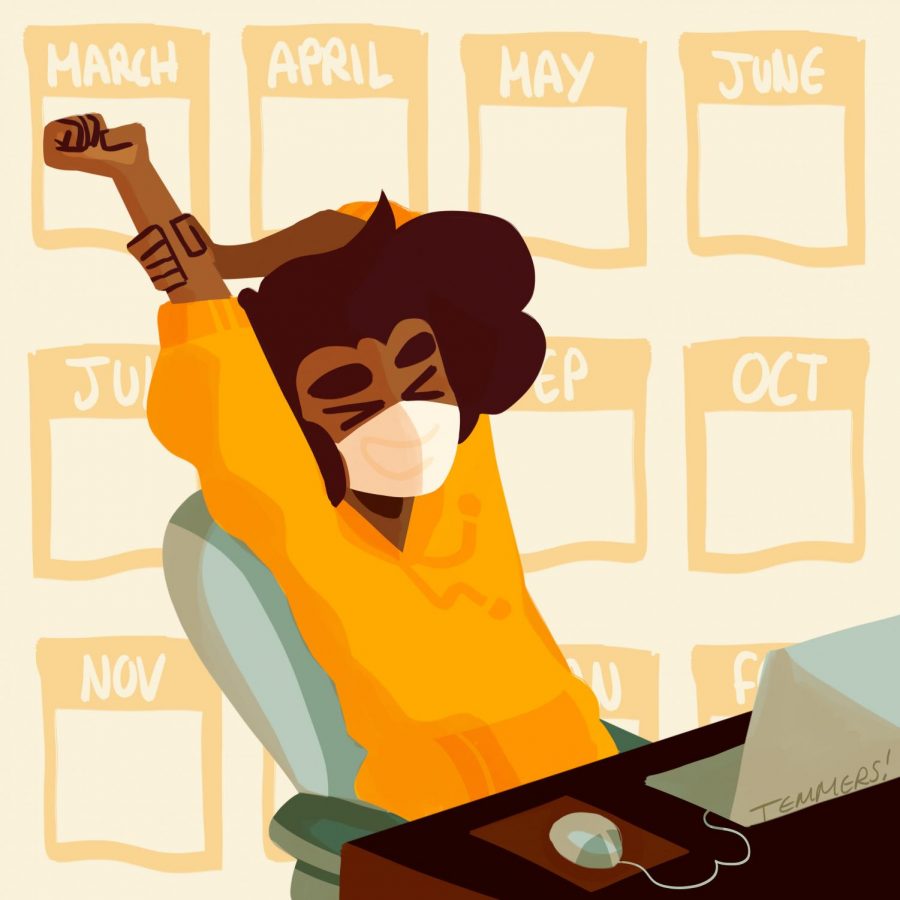Students reflect on pandemic life after a year of COVID-19
Photo By: Ana Torchia
The COVID-19 pandemic reached its first anniversary in the U.S. on March 13. The impact of COVID-19 has changed the way society functions entirely. From practicing social distancing, working from home and it being normalized to wear a face covering and getting tested frequently, society has been turned upside down. The time between March 2020 to March 2021 to now in April has created many changes in the lives of youths.
Teenagers have needed to adapt to learning from home and have faced the consequences that come with that, both good and bad. More time at home has allowed students to explore new interests and have more time to themselves but has also caused many friendships to fizzle out and had left students feeling isolated and depressed. This was especially a problem for those who were new to high school when the pandemic began, such as current sophomore, Dennis Morfin.
“I disconnected from some friends I had over the last year, especially in the beginning because we all had to stay inside and away from others,” Morfin said. “This all started in my freshman year, so the friends I had I only knew for about a semester and a half. Since I didn’t get to know them that well, it was no surprise that I lost touch with most of them after we shifted to virtual learning.”
Although Morfin has had a hard time maintaining friendships, his experience during the lockdown and staying at home has allowed him to focus on his passion for soccer.
“When we transitioned into virtual learning, soccer got cut off very suddenly,” explained Morfin. “Because we had to stay at home in the beginning and even currently we still spend a lot of time at home, I had a lot of time to focus on my soccer skills rather than on other things which made me more motivated. Now, I come to school in person on the days that I can to practice on the field.”
Similarly to Morfin, junior Nadia Browder struggled with having to stay at home, but eventually saw the benefits.
“In the beginning, my eating habits got really bad and I lost a lot of motivation. It was hard to even just get out of bed a lot of the time,” said Browder. “I had a hard time because I couldn’t see any of my friends or people I was used to seeing on a daily basis. I was very sad in the beginning of the pandemic because the change wasn’t gradual and I didn’t have time to mentally prepare; it just kind of happened over the span of a few days and I was very overwhelmed. The worst of it was that I had a lot of anxiety because I didn’t know when it was going to end or how dangerous it was.”
Even though Browder had a troubling start to life in a post-COVID world, Browder expressed how staying at home changed her mindset. Browder did a lot of self-reflecting and she grew to appreciate herself more as she spent more time with herself.
“The biggest difference from who I was a year ago when this all started to who I am now is that I am a lot happier,” commented Browder. “I am happier because of many reasons, but mostly because I realized that I don’t need other people as much as I thought I did and I can depend on myself. The change, for me at least, was needed to grow out of who I was. I have been able to stand my ground more and mature, and overall it had a good impact on me to be a better person and for my mental state.”
Like Morfin and Browder, senior Lydia Mollhagen understood the benefits from staying indoors. However, Mollhagen would like to return to normalcy and be able to go out.
“I like to socialize and be around my friends without being worried about getting sick or getting someone else sick,” said Mollhagen. “I also just feel like when we’re older, we’re going to have all these responsibilities and not be able to enjoy life the way we can now. So, I’d like to have fun and make memories while I’m at an age that I have more liberty to do so.”
Mollhagen asserted her frustrations about the new societal rules for COVID because she believes that the pandemic would be more controlled now if people did what they were supposed to a year ago.
“A lot of people didn’t take the virus seriously and continued to go out and not take the necessary precautions,” Mollhagen remarked. “If everyone had just done what they were supposed to do, it’s very likely that the pandemic would have been behind us by now or at least a lot less worrisome than it is currently.”
Overall, the students who shared their thoughts feel that their experience from the pandemic has helped them grow as individuals, but they are ready to return to life without fear of the virus. Each student is now more conscientious about their cleanliness and will continue to practice sanitary habits even after COVID is no longer a concern. Browder noted that she believes that rules for cleanliness should have been implemented long before the pandemic.
“I am always going to have my cleanliness in the back of my mind now, and I don’t think that would have been the case if the pandemic never happened,” Browder said.



